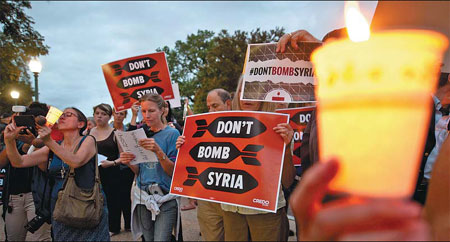Possible breakthrough in crisis
Damascus agrees to proposal from Moscow to give up chemical weapons
US President Barack Obama said a Russian plan to avert US strike threats on Syria by securing a deal to destroy the government's chemical weapons could be a "significant breakthrough".
Obama warned on Monday he had not taken military strikes off the table, but, in agreeing to consider the Russian initiative, he effectively pushed back the timetable for possible action.
Syrian Foreign Minister Walid al-Muallem on Tuesday said Damascus has "already agreed" to the initiative by Russia for Damascus to hand over its chemical weapons stocks to international control.
"Yesterday, we had a round of very fruitful negotiations with (Russian Foreign Minister) Sergei Lavrov, and he came forward with an initiative on chemical weapons," Muallem said.
"And already (yesterday) in the evening we agreed with the Russian initiative."
In a series of television interviews, he insisted it had only come about because Syrian President Bashar al-Assad and Moscow could see the United States was serious about using force.
"I think what we're seeing is that a credible threat of a military strike from the US, supported potentially by a number of other countries around the world, has given them pause and makes them consider whether or not they would make this move," he told US television network NBC.
"And if they do, then this could potentially be a significant breakthrough. But we have to be skeptical because this is not how we've seen them operate over the last couple of years."
In separate interviews with several US broadcasters, Obama said he had discussed the issue with Russian President Vladimir Putin at last week's G20 summit in St. Petersburg.
Washington's European allies gave a similarly cautious welcome to the plan, and UN Secretary-General Ban Ki-moon issued his own plea for a mission to secure and dispose of the weapons.
During a meeting with his Syrian counterpart in Moscow, Russian Foreign Minister Sergei Lavrov urged Damascus to "place chemical weapons under international control and then to have them destroyed".
Iran "favorably welcomes" the Russian plan, the Foreign Ministry spokeswoman Marzieh Afgham said on Tuesday. The proposal should include the destruction of chemical weapons in the hands of rebel groups fighting to topple Assad's government.
Welcomed proposal
The rebels who hoped to see US missiles rain down on the government denounced the idea as a plot by Putin to protect the Syrian leader.
Britain's Prime Minister David Cameron also expressed concern that the plan might be "a distraction tactic" but broadly welcomed it.
German Chancellor Angela Merkel described the Kremlin's proposal as "interesting" but added that she hoped it would be put into place quickly and not simply be used to "buy time".
And France, the only Western ally to have offered to take part in a US-led strike, said Assad must commit "without delay" to the elimination of his chemical arsenal.
United Nations chief Ban, meanwhile, called for the creation of UN supervised zones in Syria where the country's chemical weapons can be destroyed.
He told reporters he may propose the zones to the Security Council if UN inspectors confirm banned weapons were used and to overcome the council's "embarrassing paralysis" over Syria.
For his part, Assad warned earlier in an interview with US television that the United States will "pay the price" if it attacks Syria.
But US cruise missile destroyers are idling in the eastern Mediterranean, preparing for what US officials described as a limited punitive strike.
According to US intelligence, on Aug 21 a chemical attack against rebel-held suburbs of Damascus killed more than 1,400 people.
Western states and the Arab League have condemned the alleged barrage as a war crime and blamed it on Assad's government.
Obama has argued that a military strike is necessary to defend the long-established international taboo against the use of chemical weapons.
The crisis in Syria began in March 2011 and eventually degenerated into an all-out civil conflict that has killed more than 100,000 people, according to the UN.
AFP-AP
|
People protest against a US military intervention in Syria in Washington on Monday. US Senate Majority Leader Harry Reid said he was delaying a key vote on authorizing the use of force in Syria to let US President Barack Obama publicly address the issue. Nicholas Kamm / Agence France-Presse |
(China Daily 09/11/2013 page12)















